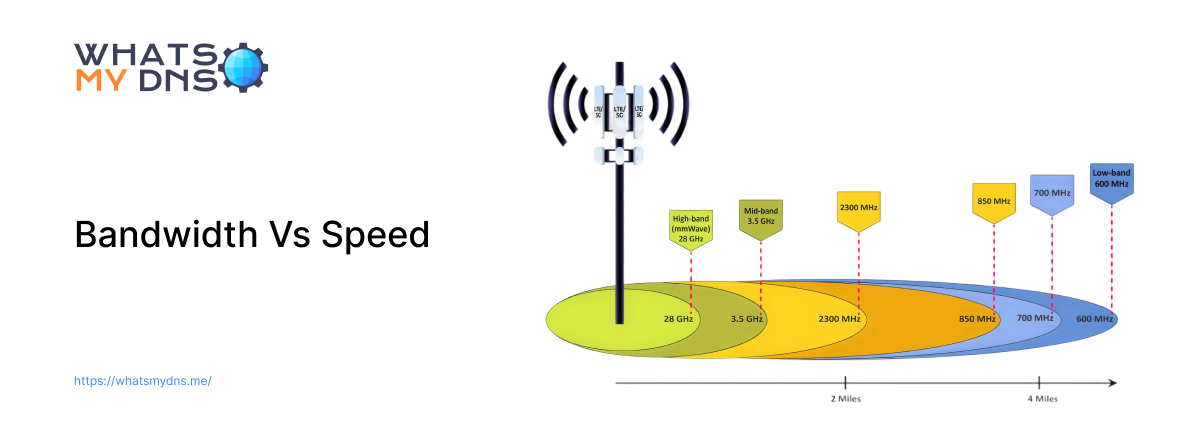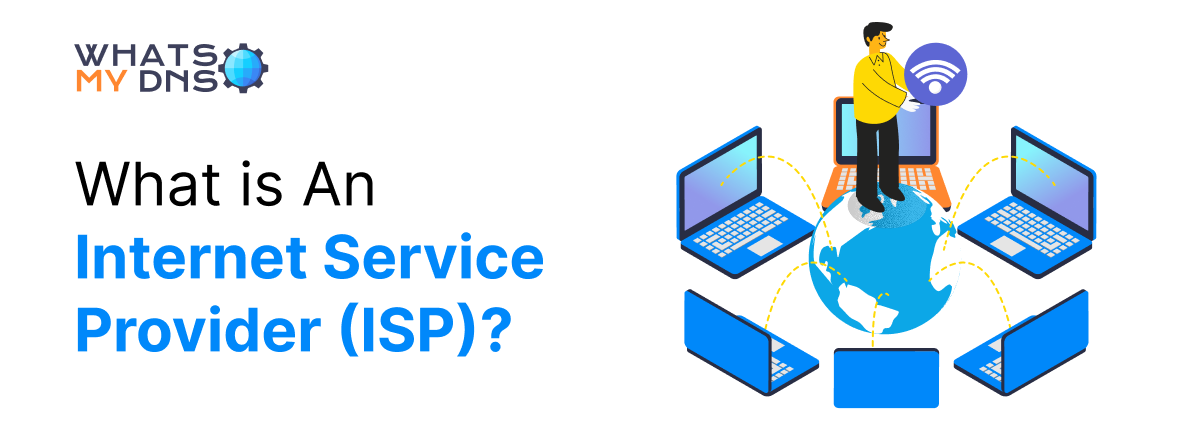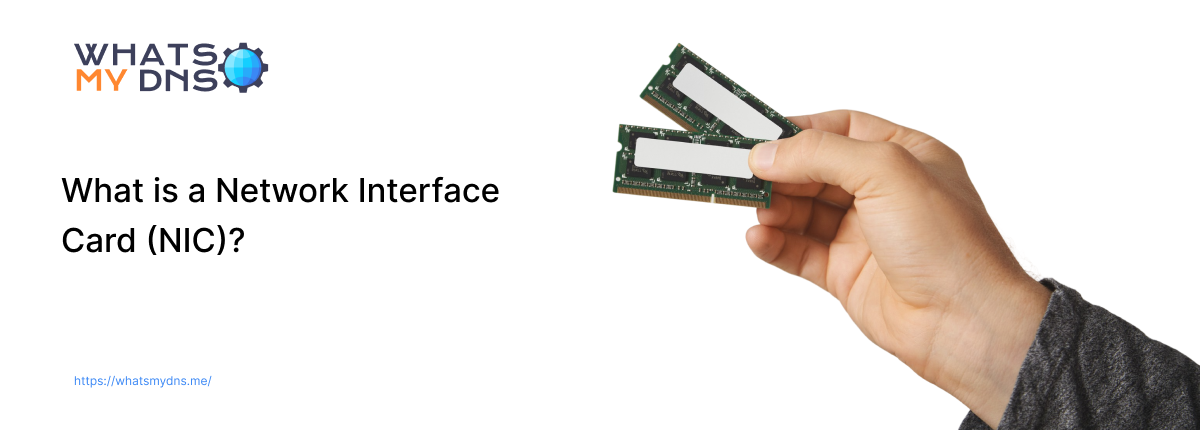Bandwidth Vs Speed - A Complete Guide to Understand the Difference

- 02 July 2025
Bandwidth and internet speed are two different terms that many often use interchangeably. The misconception is so much that whenever individuals face slow internet speed, they start thinking about enhancing their bandwidth. Bandwidth impacts speed, but it is not the only factor. There are many others as well. This guide is about bandwidth vs internet speed. If you are among those having the said misconception, stick with us to the end to learn the differences between the two.
What is Bandwidth?
Internet bandwidth is the maximum capacity of data transmitted (sent or received) over a network connection in a dedicated period. It is measured in several units; commonly used include:
- Bits per second (Bps)
- Kilobits per second (Kbps)
- Megabits per second (Mbps)
- Gigabits per second (Gbps)
The following analogy will help you understand the bandwidth better.
Imagine a water pipe having a certain circumference. Your network bandwidth is the maximum amount of water (data) that can travel through the pipe circumference (your network) at once.
This means the higher your network bandwidth is, the more data can be sent or received through it.
Pros and Cons of High Bandwidth
|
Pros |
Cons |
|
|
If you want to improve your network's bandwidth, check out our blog post on “how to increase bandwidth.”
What is Internet Speed?
Internet speed refers to how quickly data packets flow between your device and the target server. It is also called latency or ping and is usually measured in milliseconds (ms).
Remember the analogy earlier, stating bandwidth as the maximum amount of water that can travel through the pipe at a time.
In that case, the internet speed is how much faster water (meaning your data) can pass through that pipe (your network) in a second.
|
Pros |
Cons |
|
|
If you are facing a slow internet issue and want to resolve it, check out the simple fixes in our blog post on “how to improve internet speed.”
Bandwidth vs Speed: Key Differences
In the table below, we have provided a side-by-side comparison of bandwidth vs internet speed. Going through it will help you better understand the difference between the two.
|
Bandwidth |
Speed |
|
The maximum amount of data that can be transmitted over a network in a given time (per second). |
The speed at which data is transmitted (sent or received) over a network in a given time (per second). |
|
It determines the capacity of your internet connection. |
It determines the performance of your internet connection. |
|
The quantity of data. |
Time taken to move data. |
|
Affect how many users can use a network connection without congestion. |
It affects how fast pages load and files get uploaded or downloaded by users on the network. |
|
It is always higher than the internet speed. |
It cannot be higher than the network bandwidth. |
|
Bandwidth is not much affected by latency. You can have a high bandwidth with high latency. |
Latency is not affected by bandwidth. It is affected by the number of “hops” between devices. |
|
Bandwidth depends upon:
|
Internet speed depends upon:
|
How to Check Your Bandwidth and Internet Speed?
You can use many methods to check your bandwidth and internet speed. Some common ones include:
- Internet speed test tool
- Network performance monitoring software
- Your router settings (not all models show the information)
Among the above-listed methods, the simplest and quickest way to check bandwidth and internet speed is to conduct an internet speed test. You can do this with one click using our internet speed test tool.
Just visit the tool, click on the “Go” button, and let the tool conduct the test (just a matter of seconds). Once finished, you will get the following information in the results:
- Upload speed (how fast data is being sent)
- Download speed (how fast data is being received)
- Ping (Latency or delay in connection)
- Jitter (fluctuation in the delay)
Common Misconceptions
When it comes to bandwidth vs internet speed, we often hear many misconceptions. Some among them are technical, and some are just user-level misunderstandings. Below are some of the most common misconceptions you might have heard of.
-
More Bandwidth Always Means Faster Internet
“If I get a plan with more bandwidth, my internet will automatically be faster.”
This is totally a total misconception. In reality, more bandwidth allows more data to flow at once. Yet it impacts the internet speed, but that doesn’t always make things faster.
In simple terms, even if your bandwidth is high, other factors like your device, router, number of connected users, and network congestion can still slow things down.
-
Only Download Speed Matters
“Better download speed, my internet is good.”
Well, this is another misconception among many. However, upload speed is as critical as download speed, especially regarding browsing, online streaming, video calling, etc. If your upload speed is low and your download speed is faster, you still will face a slow internet experience.
Why so? Because in many of the services, i.e., video calling, online browsing, we are sending data over the network. The upload speed directly impacts how much data you can send at a time. That is why a low upload speed gives you a slow internet experience.
-
Low Bandwidth is the Only Cause of Slow Internet Speed
“If my internet is slow, it is due to low bandwidth.”
Yes, a low bandwidth can slow down your internet, but only when the network is congested. Bandwidth is just a piece of the puzzle and is not always the culprit for slow internet speed.
Other factors such as weak wifi signals, low-quality Ethernet cable, outdated router firmware, or hardware limitations, also cause slow internet speed, even if you have high bandwidth.
Wrapping Up
Bandwidth and internet speed are both critical metrics of a network connection. Many people use them interchangeably, but both differ in many aspects, as described in this blog post above.
If you want to know the maximum data capacity your network can transmit, bandwidth is the parameter to measure. If you want to know how much faster data can be sent or received via your network, then internet speed is the metric you should measure.
The good thing is that measuring both is not much of a technical thing to do. Whatsmydns.me offers you a free internet speed test tool that you can use to measure the bandwidth and speed of your network connection. Give it a try, it’s fast, simple, and reliable.
FAQs
Why is my internet slow, even with high bandwidth?
There can be many reasons your internet becomes slow, even with high bandwidth. For example, high network latency, congestion, damaged cable, outdated hardware, etc.
Can multiple devices affect my bandwidth and speed?
Yes, when multiple devices connect to the same network, the bandwidth is distributed among all in a certain amount. When overloaded, it will slow down your internet speed.
Can my ISP throttle my bandwidth or speed?
Yes, ISPs can throttle (intentionally slow down) your internet speed based on your usage. This often happens during peak hours or if you've exceeded a data cap.
How does latency differ from bandwidth?
Latency is the delay in data transmission, measured in milliseconds (ms). It is how long a signal travels from your device to a server and back. Bandwidth is the maximum data capacity. High latency can make a connection feel slow, even with high bandwidth.
Related Blogs

What is An Internet Service Provider (ISP)?
ISP is The company that connects you to the internet—learn how it works and why it matters!"
- 19 Mar 2025

How to Hide My IP Address
Learn easy ways to hide your IP address and stay safe online
- 30 Apr 2025

What is a Network Interface Card (NIC) | Components, Types, & Working Explained
Learn what a Network Interface Card (NIC) is, how it works, and why it matters - explained in simple words for everyone.
- 05 Jun 2025